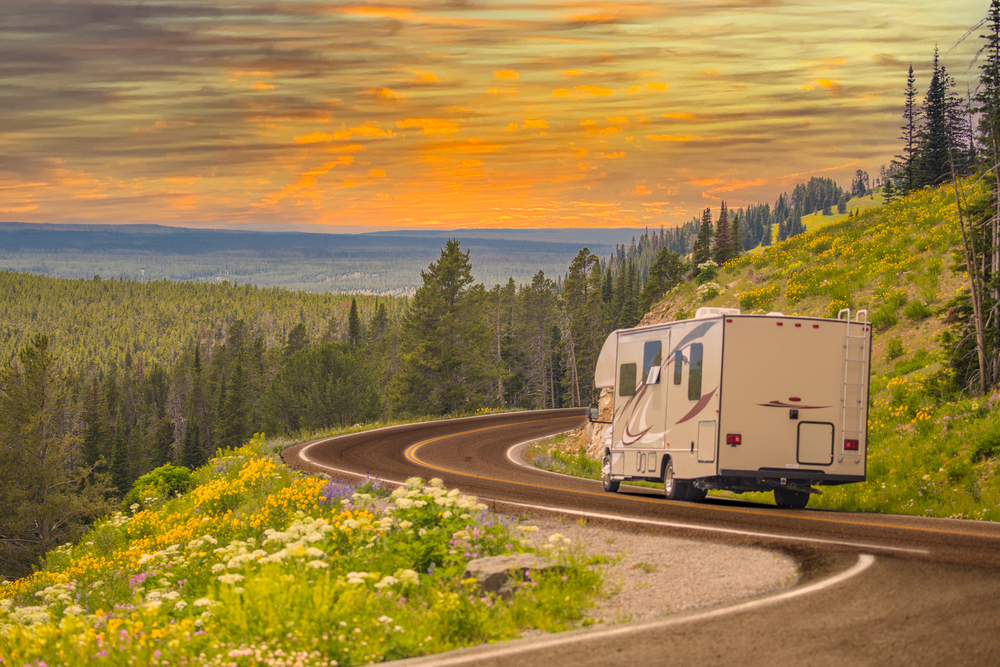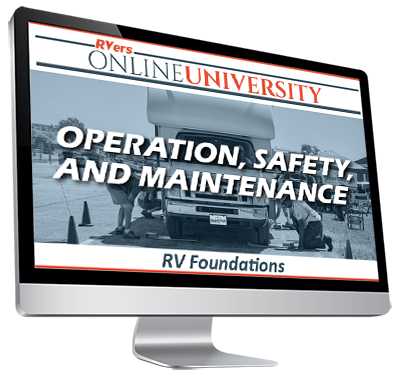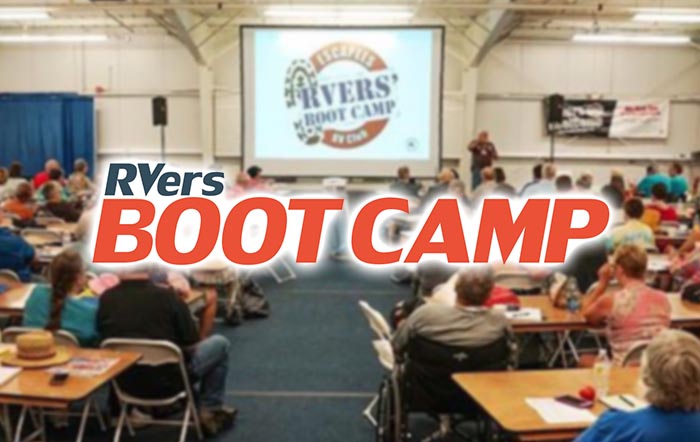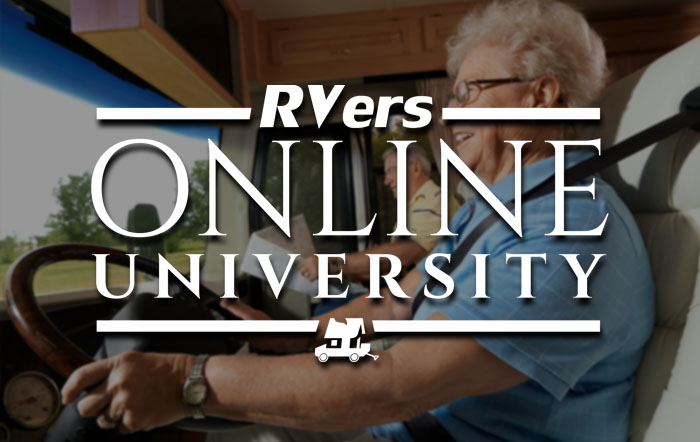Are you considering the full-time RV lifestyle? If so, you’re in the right place! Escapees RV Club is a helpful RV membership club for all RVers, and we have tons of resources for education, support, community, and more for full-time RVers. In this comprehensive guide, we’re diving into the different aspects of preparation for full-time RV living that you should consider as you plan to embark on this unique adventure.
This guide is structured to help you learn how to prepare, downsize, figure out income on the road, mail, legal matters, and actually traveling. However, you can click through the table of contents below to jump to the sections that interest you most. Without further ado, let’s get started!
- Preparing for Full-Time RV Life: The Planning Phase
- Learn How to Become a Full-Time RVer
- Downsizing for Full-Time RV Living
- Full-Time RV Living Income and Finances
- Preparing for Life On the Road
- Learn How to Safely Operate and Maintain Your RV for Full-Time RV Living
- Campsite and Travel Planning for Full-Time RV Life
- Learn How to Prepare for Full-Time RV Living with RVers Online University
Preparing for Full-Time RV Life: The Planning Phase
Embarking on a full-time RV life journey is exciting and transformative. It requires careful planning and consideration, especially in the initial stages. The following steps are crucial for preparing for your new lifestyle on the road.
Start Researching RVs

The first step in your full-time RV journey is to conduct thorough research about the type of RV you want to live and travel in. A popular saying is to “Buy your last RV first”, but that’s not always possible because oftentimes experience and wisdom only come from actually living in an RV.
As you research RVs, consider your family’s needs, wants, and expectations. Do you need separate rooms, lots of storage, and plenty of privacy for everyone? If so, a large fifth wheel may be just what you need.
A great way to research RVs is to visit local dealerships and RV shows and browse all the RVs they have available. Getting inside an RV is a great way to get a good feel for it.
Or, do you want a smaller footprint with the ability to take your rig just about anywhere? If that’s the case, a small travel trailer or Class B campervan might be right up your alley. If you’re unsure about the different types of RVs and trailers, our RV Types Guide will be really helpful.
RV Shopping Tips
When shopping for an RV, it’s crucial to balance your desires with practicality. Use our handy free downloadable guide below to help you during your RV shopping phase.
Download the Free Choosing an RV Power Pack!
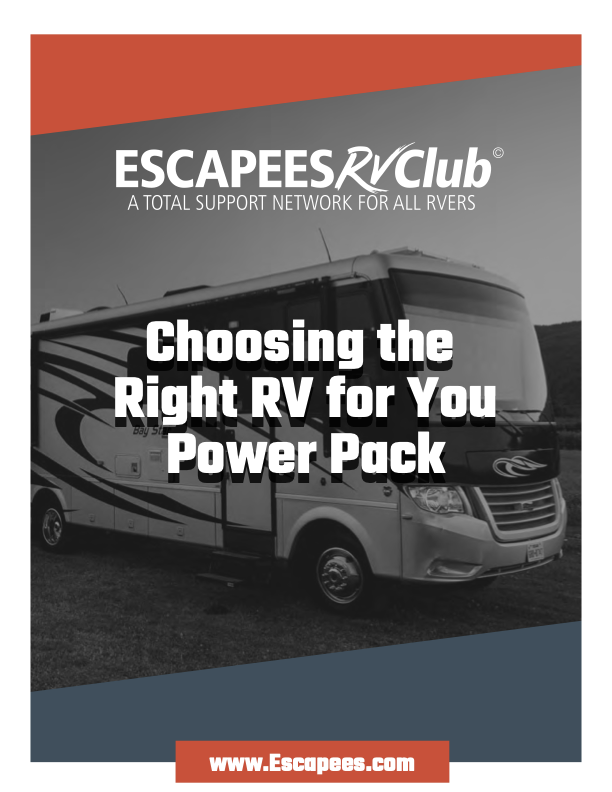
This Power Pack includes an RV Shopping worksheet, Tips for RV Shopping, RV Weights and Terms To Know Glossary, and an RV Shopping Cheat Sheet!
Should You Buy New or Used?
Deciding between new or used is a significant consideration, and it’s not always an easy answer. The “best option” varies depending on who you ask.
New RVs come with the latest features, warranties, and the peace of mind of being the first owner. However, newer RVs also come with a higher sticker price, a “shakedown period” where you test it out and make sure everything is assembled correctly, and they depreciate rapidly.
Used RVs have usually already had the kinks worked out. Additionally, they typically have a lower price point. However, used RVs can harbor hidden issues and damage, and they may be harder to finance depending on the year.
When considering this decision, weigh your pros and cons along with your budget, future plans, and expectations. Explore our guide: Should you buy a new or used RV?
What to Look for When Buying a Used RV
Buying a used RV requires a keen eye. There are a lot of things you should look for when considering a used RV.
Its important to assess the condition of the RV to make sure that everything is in working order, and there are certain spots you should check to make sure that you won’t find any hidden damage later on. To learn what to look for when buying a used RV, our article Tips For Buying a Used RV has some excellent tips and spots to check. If you’re looking at an older motorhome, we also have a guide with 7 things you should know before buying an old motorhome.
If you’re considering buying a used RV from a private seller, check out How to Purchase a Used RV from a Private Seller.
Why You Need a 3rd Party RV Inspection
Even if a used RV appears to be in great condition, it’s wise to invest in 3rd party RV inspection. A certified RV inspector can uncover issues that might not be visible to the untrained eye, saving you from future costly repairs. They can provide an unbiased assessment of the RV’s condition, including the structural, electrical, and mechanical aspects. An RV inspection will give you a clearer picture of what you’re buying and can be a powerful negotiating tool if issues are uncovered.
To find certified RV inspectors near you, we highly recommend using the National RV Inspector’s Associations (NRVIA) website: https://nrvia.org/
Learn How to Become a Full-Time RVer
If you’re feeling overwhelmed by the idea of learning how to become a full-time RVer, we have you covered! Escapees RV Club is a full-service membership for RVers, and we have a helpful online course that will help you navigate every single step involved with hitting the road and going full-time.
Our course, Roadmap to Full-Time RVing, provides a true roadmap for helping you plan your launch. Click the button below to learn more about this helpful online course!
Do you dream of becoming a full-time RVer? If so, check out our premier online course: Roadmap to Full-Time RVing!
Roadmap to Full-Time RVing covers everything you need to know to become a full-time RVer, from downsizing and buying the perfect RV to how to find campgrounds and navigate your first challenges on the road!
Downsizing for Full-Time RV Living
Transitioning to full-time RV life means adopting a minimalist lifestyle. This process often requires a significant downsizing effort. Let’s explore how to efficiently and effectively reduce your possessions to fit comfortably in your new home.
Stop Buying New Things!
The first rule of downsizing for RV living is simple: stop acquiring new items. Before making any purchase, ask yourself if it’s essential for your RV life and if you are sure that you will have a home for it. Remember, space is at a premium in an RV, and every item should have a purpose (and a home).
This mindset shift is crucial for easing the transition to a more minimalist lifestyle. It’s also a good time to start embracing experiences over possessions, which is a major reason why many of us choose full-time RV life in the first place!
Start with Big Things First
Begin your downsizing journey by tackling the larger items. Furniture, large appliances, and bulky decorative items are unlikely to fit in your RV. Of course, you’ll need to keep the minimum amount of furniture you need in your home on a daily basis, but getting rid of the large and heavy “extras” early on will make the last weeks of your sticks-and-bricks lifestyle a lot easier.
Make Several Sweeps Through Small Things

When downsizing through smaller things like books, knick-knacks, and especially clothes and shoes, you will likely need to make several sweeps and downsizing efforts.
For example, you may do your first downsizing effort several months before your “launch date” and get rid of a good amount of stuff. As the date gets closer and you do another sweep, you’ll find that there are actually more items that you can do without.
In fact, many RVers continue the downsizing journey after they’ve already moved into an RV.
It can be really hard and emotional to part with certain items for sentimental reasons – clothes, shoes, decor, etc. As you go through this transition, it’s important to be patient with yourself and work through the emotions associated with parting with some special items. You won’t need to part with everything, but there may come a time where you decide you don’t need certain things anymore. Just remember that it is a process and you don’t have to do it all at once.
Decide Whether or Not You Will Get a Storage Unit
Deciding whether or not to get a storage unit is a big question for prospective full-time RVers.
On one hand, getting a storage unit can provide you with some peace of mind and comfort that you don’t have to get rid of all of your furniture and large possessions. It provides you the ability to have all of your stuff safely stored away in the event that you move back into a stick-and-bricks home. It can also help you avoid the stress of donating and selling your stuff.
But storage units require monthly payments which can get costly if you have a lot of stuff.
Some new RVers will get a storage unit and move everything into it to test out the RV life. Then, once they learn they want to stay on the road long term, they work on downsizing from their storage unit. Weigh the pros and cons and choose what works best for your situation.
Learn more about downsizing in the article Downsizing for RV Life or watch our webinar on Downsizing for RV Living!
Full-Time RV Living Income and Finances
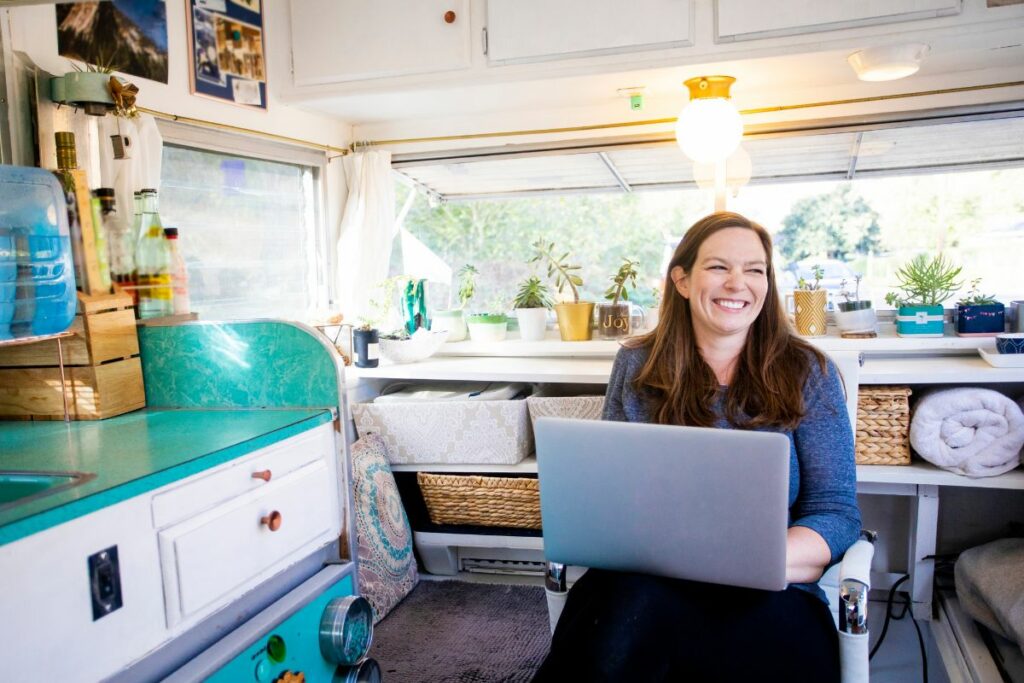
Unless you’ve saved up for the journey ahead or you’re retired, adopting a full-time RV lifestyle requires a solid plan for earning money on the road. The good news is that we live in a digital age, and there are numerous ways to earn a living while on the road.
How to Take Your Current Job on the Road
The first option for earning money from the road will be to see if your current job is one that can easily translate to a location-independent working situation. If you have this type of job, consider negotiating a remote work arrangement with your employer.
If your tasks can be done online, it may be simple to transition into a remote work arrangement. Present a well-thought-out plan to your employer highlighting how you can manage your responsibilities remotely. Focus on your responsibility and highlight your achievements and don’t put an emphasis on your new traveling lifestyle. Your employer cares much more about your ability to get work done quickly, correctly, and efficiently than they care about your new traveling lifestyle. In some cases, the RV lifestyle may make them feel apprehensive, which is why it’s essential to focus on your capabilities and minimize the travel aspect.
How to Find Remote Jobs for Full-Time RV Living
If you don’t already have a job that can easily transition into a remote job, there are many jobs hiring remote workers these days. From entry-level customer service jobs to more skilled jobs in tech, marketing, and more, so much can be done online these days.
Explore online job boards and look for remote work on popular job search sites like FlexJobs and LinkedIn to find opportunities.
Other Options: Workamping, Entrepreneurship, & More
If traditional employment isn’t appealing or feasible, consider alternative income sources.
- Workamping: Workamping is working at a campsite or campground in exchange for something of value. These situations almost always include a free campsite, and some of them pay you a salary as well. It’s a great way to reduce living and travel expenses and meet other RVers. You can do a Google search for “Workamping Jobs” to find Workamping job boards, and you can also check out the site Coolworks.com and filter by categories to see what they have. Coolworks has jobs with RV sites, jobs at national parks with dormitories, and so much more.
- Freelancing: Leverage your skills to take on freelance work. Platforms like Upwork, Fiverr, and Freelancer can connect you with clients needing services in many industries.
- Entrepreneurship: You can turn your passion into a business, although this is a more high-risk venture. You can start a business for crafting, consulting, content creation, ecommerce, and much more.
- Seasonal jobs: Many RVers take on seasonal jobs such as working in national parks, oil field gate guarding, the yearly sugar beet harvest, and much more. Explore our article Seasonal Jobs for Working RVers to learn more.
The key to financial success while living full-time in an RV is flexibility and adaptability. Explore various income streams to find what best suits your skills and lifestyle.
Internet for Full-Time RV Living
Maintaining a reliable internet connection is crucial for full-time RVers, especially if you’re working from the road. Here are some effective options for staying connected:
- Hotspot from your cell phone: using your phone as a hotspot is one of the easiest ways to access the internet. Most cell phone plans offer a hotspot features, allowing you to share your phone’s connection with other devices. It’s convenient for light browsing and emails, but be mindful of your data limits and the strength of your cell signal.
- Mobile wi-fi plan through your cellular carrier: Many cellular carriers offer dedicated mobile wi-fi plans which include portable modem the connects to the cellular network. These plans typically offer more data than a standard phone hotspot, making them a better choice for heavier internet use.
- Satellite RV internet: This option is helpful for RVers in remote areas where cell service is weak or nonexistent. In recent years, companies like Starlink have emerged on the satellite internet scene and have made RV satellite internet more accessible, both physically and financially. Learn more about Starlink in our article: Starlink for RVs.
It’s important to note that relying on public or campground wi-fi is not advisable for full-time RVing remote workers, because it isn’t always reliable, secure, or work as expected. Many campgrounds advertise free wifi as a perk, but it rarely ever works well enough to maintain a consistent connection for working.
RV internet is such a broad topic that simply can’t be contained in one article or section. Be sure to check out our friends Chris and Cherie at the Mobile Internet Resource Center and browse their helpful guides on all things mobile internet.
Preparing for Life On the Road
As you get closer to beginning your full-time RV adventure, there are some essential logistical aspects to consider, These include how you’ll receive mail, manage your domicile, insure your RV, and possibly homeschool your children.
How to Get Your Mail
One of the biggest questions for full-time RVers is how to manage mail. There are many ways that RVers get their mail, but the easiest solution is the Escapees RV Club Mail Forwarding Service. Our mail forwarding service was designed specifically for RVers and it provides a secure way to receive your mail no matter where you travel in North America.
You get a physical address and private mailbox at our professional mailroom at Escapees RV Club headquarters, and our friendly mail room staff will forward your mail to you as you travel throughout North America whenever you are ready to receive it.
Learn more about our Escapees RV Club Mail Service here.
Your Physical Address and Domicile
Establishing a legal domicile is important for voting, takes, banking, legal purposes, and more. Full-time RVers often face challenges in this area, as traditional residency requires a stationary address.
Our mail forwarding service provides a solution – you can choose a physical address to use as your domicile in either Texas, South Dakota, or Florida.
Domicile is a big topic and one that can have certain legal implications. Learn more about this topic with our Domicile guides and articles here.
Homeschooling
For families embarking on the full-time RVing lifestyle, homeschooling may become an important topic. The flexibility and ever-changing environment of RV living can provide a rich educational experience for children.
You can start by researching homeschooling laws in your domicile state and getting connected with Fulltime Families and their Roadschooling guide.
Learn more about homeschooling on the road with Roadschooling 101: Homeschooling on the Road.
Learn How to Safely Operate and Maintain Your RV for Full-Time RV Living
Do you want to learn more about RV preventative maintenance so you can save yourself costly repairs and protect your investment?
Visit RVers Online University today to learn more about RV preventative maintenance, RV safety, and much more! Taught by RV-industry experts, RVers Online University helps you save money and enjoy life on the road.
Campsite and Travel Planning for Full-Time RV Life
As you transition into full-time RV life, effective campsite and travel planning become essential. Leveraging RV clubs, memberships, and digital tools can greatly enhance your experience. Additionally, understanding various camping styles and starting with local trips can help ease the transition, Let’s explore each of these aspects.
RV Clubs and Memberships
Joining RV clubs and memberships can provide significant benefits, such as discounts, community support, and unique camping experiences. Consider these options:
- Escapees RV Club: Ideal for full-time RVers, offering extensive support services, educational resources, and community events.
- Harvest Hosts: A unique membership offering overnight stays at wineries, farms, and breweries. It’s perfect for those looking for a different kind of camping experience.
- Boondockers Welcome: Great for finding free overnight parking spots on private properties, often with the added benefit of local hosts’ knowledge.
- Passport America: Offers significant discounts at a network of campgrounds across the USA, which can be a huge cost saver.
- Fulltime Families: Tailored for families on the road, providing community support, meetups, and resources for homeschooling.
Each club or membership offers unique perks, so consider your travel style and preferences when choosing.
Apps and Websites to Find Campgrounds
Finding the right campgrounds is a breeze with the help of various apps and websites. Some notable ones include:
- AllStays: A comprehensive resource for finding campgrounds, RV parks, and service centers.
- Campendium: Offers detailed campground reviews and information, ideal for finding the perfect spot.
- iOverlander: Useful for discovering off-the-beaten-path camping options, especially for boondocking.
- Recreation.gov: The go-to source for booking campsites in national parks, forests, and other federal lands.
These tools not only help in finding campgrounds but also provide user reviews, amenities information, and reservation options. Of course, these websites and apps are not an exhaustive list. There are so many websites and apps to help you find campgrounds. Check out our guide: The Complete Guide to Finding Budget-Friendly RV Camping Options for more ideas.
Learn Different Styles of Camping
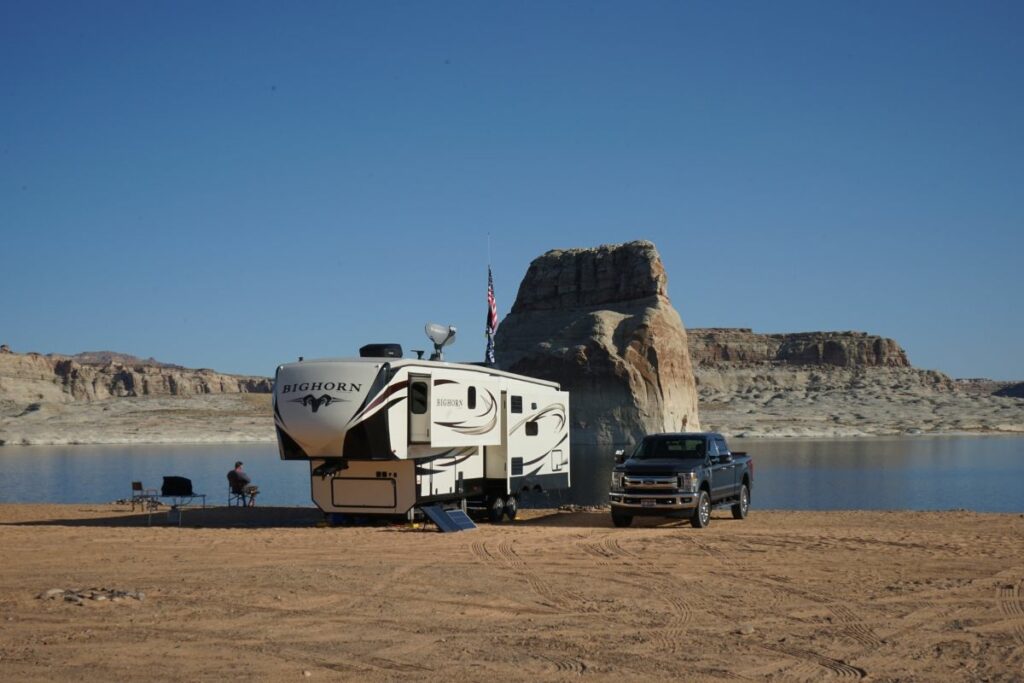
Understanding different camping styles is crucial for full-time RV living:
- Boondocking (or dry camping) involves staying in places without hookups, often free or low-cost. It’s great for experiencing nature and off-grid living.
- RV Resorts offer full hookups and amenities like pools, laundry facilities, and community activities but tend to be more expensive.
- State Parks usually provide a balance with natural settings, basic amenities, and reasonable rates.
Each style offers a unique experience, so try different types to see what suits you best.
Try Short Local Trips First
Before diving into full-time RV life, start with short local trips. These ‘trial runs’ help you get accustomed to your RV, from driving and parking to using all its systems. They are also good opportunities to identify what you need to pack for longer trips. Short trips close to home allow you to work out any kinks and make adjustments in a low-pressure setting. This step is invaluable in building confidence and ensuring you are well-prepared for the longer journeys ahead.
Learn How to Prepare for Full-Time RV Living with RVers Online University
Our premiere online RV education platform, RVers Online University, provides detailed step-by-step courses that allow you to learn at your own pace. Whether you want to learn how to operate and maintain your RV safely or you want a step-by-step guide to hitting the road full-time, explore the offerings on RVers Online University! Learn more about all of our educational resources on this page.
For a limited time, you can get both RVers Online University courses for free when you sign up for an Escapees RV Club membership! Learn more at the button below.
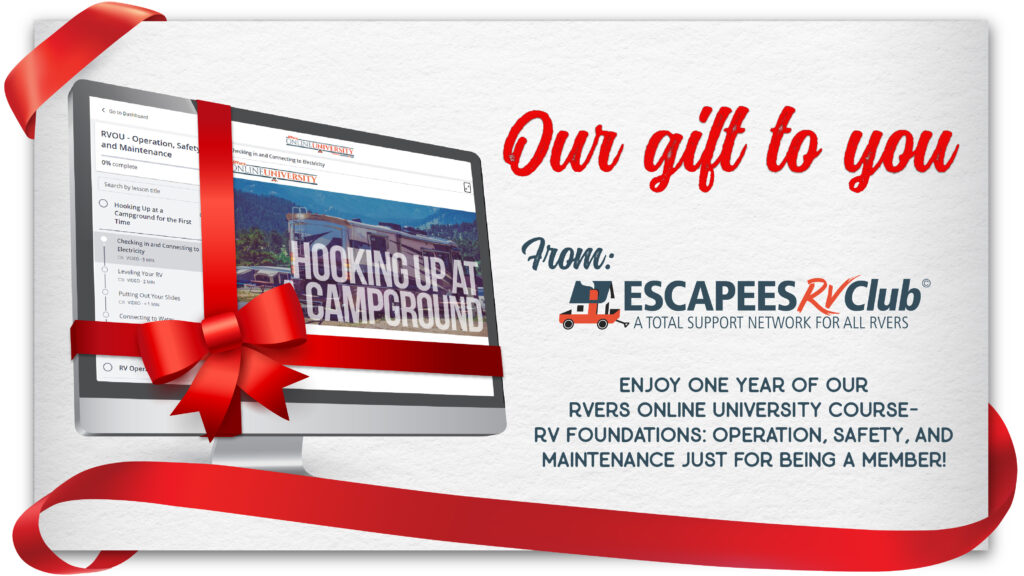
Escapees RV Club Members can enjoy a year of RVers Online University for free!
Sign up before May 31,2024 and receive our RV Foundations: Operation, Safety, and Maintenance course for free, a $127 value!

